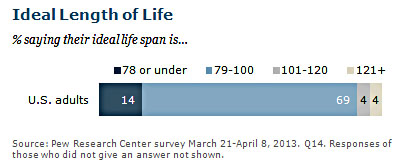As proof that timing is everything (except in real estate, of course, where it’s location), Pew Research is getting lots of attention today for a new survey about American attitudes toward radical life extension. What’s so great about the timing? Well, it’s August, and every  blogger in the country is having a hard time finding anything to write about. So the Pew survey is getting lots of attention.
blogger in the country is having a hard time finding anything to write about. So the Pew survey is getting lots of attention.
As near as I can tell, the main takeaway from the whole thing is that most people lack even the tiniest spark of imagination. Take a look at the response on the right. Nearly everyone thinks the ideal lifespan is between 79 and 100. What an amazing coincidence! No one wants a shorter life than they live now, and no one wants a life that’s much longer either. If Pew had surveyed fruit flies, they all would have said the perfect lifespan was around 38 days or so.
The headline result of the survey is that more than half of the respondents said they wouldn’t want treatments to “slow the aging process and live to be 120 or more.” I guarantee you that nearly all of them are mistaken. Or lying. If such a treatment actually existed, every baby boomer in the country would be lining up at their local hospitals to get it, and would be demanding that Medicare pay for it. There would be a few exceptions for the chronically depressed and those suffering from debilitating illnesses, but that’s about it. The rest of us, given an opportunity to live healthy lives for an extra 40 or 50 years, would jump at it.

















